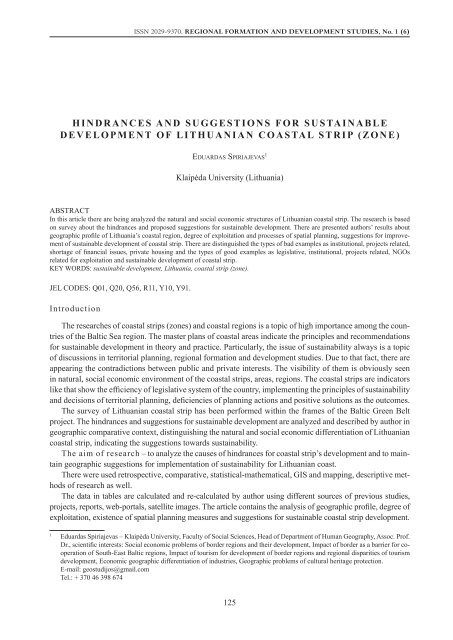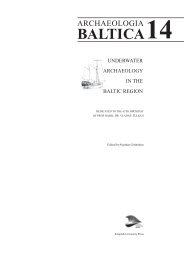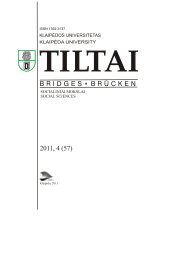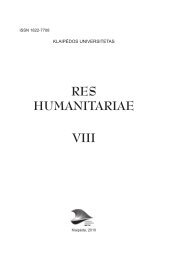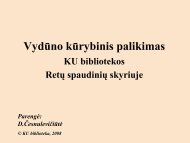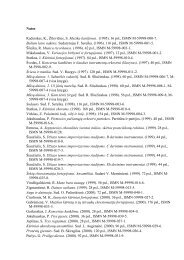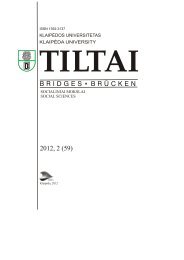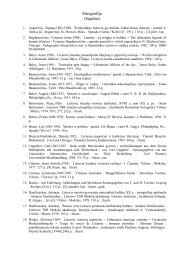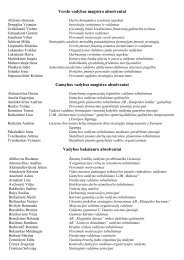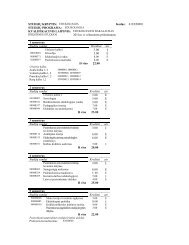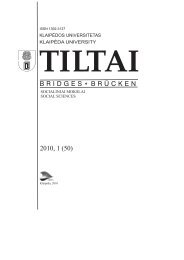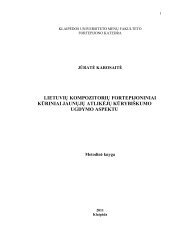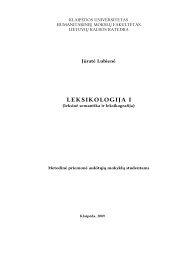Regional Formation 2012,1 - KlaipÄdos universitetas
Regional Formation 2012,1 - KlaipÄdos universitetas
Regional Formation 2012,1 - KlaipÄdos universitetas
Create successful ePaper yourself
Turn your PDF publications into a flip-book with our unique Google optimized e-Paper software.
ISSN 2029-9370. <strong>Regional</strong> <strong>Formation</strong> and Development Studies, No. 1 (6)<br />
HINDRANCES AND SUGGESTIONS FOR SUSTAINABLE<br />
DEVELOPMENT OF LITHUANIAN COASTAL STRIP (ZONE)<br />
Eduardas Spiriajevas 1<br />
Klaipėda University (Lithuania)<br />
Abstract<br />
In this article there are being analyzed the natural and social economic structures of Lithuanian coastal strip. The research is based<br />
on survey about the hindrances and proposed suggestions for sustainable development. There are presented authors’ results about<br />
geographic profile of Lithuania’s coastal region, degree of exploitation and processes of spatial planning, suggestions for improvement<br />
of sustainable development of coastal strip. There are distinguished the types of bad examples as institutional, projects related,<br />
shortage of financial issues, private housing and the types of good examples as legislative, institutional, projects related, NGOs<br />
related for exploitation and sustainable development of coastal strip.<br />
KEY WORDS: sustainable development, Lithuania, coastal strip (zone).<br />
JEL Codes: Q01, Q20, Q56, R11, Y10, Y91.<br />
Introduction<br />
The researches of coastal strips (zones) and coastal regions is a topic of high importance among the countries<br />
of the Baltic Sea region. The master plans of coastal areas indicate the principles and recommendations<br />
for sustainable development in theory and practice. Particularly, the issue of sustainability always is a topic<br />
of discussions in territorial planning, regional formation and development studies. Due to that fact, there are<br />
appearing the contradictions between public and private interests. The visibility of them is obviously seen<br />
in natural, social economic environment of the coastal strips, areas, regions. The coastal strips are indicators<br />
like that show the efficiency of legislative system of the country, implementing the principles of sustainability<br />
and decisions of territorial planning, deficiencies of planning actions and positive solutions as the outcomes.<br />
The survey of Lithuanian coastal strip has been performed within the frames of the Baltic Green Belt<br />
project. The hindrances and suggestions for sustainable development are analyzed and described by author in<br />
geographic comparative context, distinguishing the natural and social economic differentiation of Lithuanian<br />
coastal strip, indicating the suggestions towards sustainability.<br />
The aim of research – to analyze the causes of hindrances for coastal strip’s development and to maintain<br />
geographic suggestions for implementation of sustainability for Lithuanian coast.<br />
There were used retrospective, comparative, statistical-mathematical, GIS and mapping, descriptive methods<br />
of research as well.<br />
The data in tables are calculated and re-calculated by author using different sources of previous studies,<br />
projects, reports, web-portals, satellite images. The article contains the analysis of geographic profile, degree of<br />
exploitation, existence of spatial planning measures and suggestions for sustainable coastal strip development.<br />
1<br />
Eduardas Spiriajevas – Klaipėda University, Faculty of Social Sciences, Head of Department of Human Geography, Assoc. Prof.<br />
Dr., scientific interests: Social economic problems of border regions and their development, Impact of border as a barrier for cooperation<br />
of South-East Baltic regions, Impact of tourism for development of border regions and regional disparities of tourism<br />
development, Economic geographic differentiation of industries, Geographic problems of cultural heritage protection.<br />
E-mail: geostudijos@gmail.com<br />
Tel.: + 370 46 398 674<br />
125


